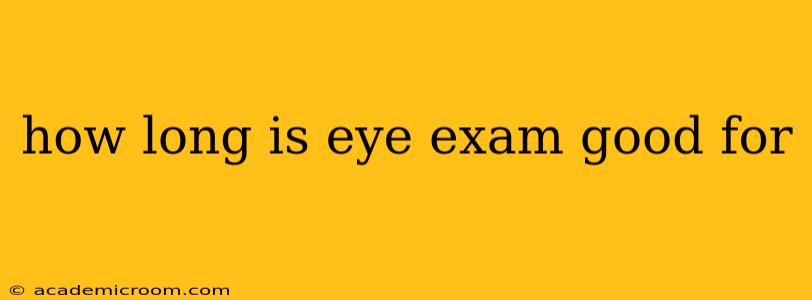Maintaining good eye health is crucial, and regular eye exams are a cornerstone of that process. But how long do the results of an eye exam actually last? The answer isn't a simple number, as it depends on several factors. This comprehensive guide will explore the validity of eye exam results and address common questions surrounding this topic.
How Often Should I Get My Eyes Examined?
This is a frequently asked question, and the answer varies depending on your age, overall health, and any pre-existing eye conditions. Generally, the recommendations are as follows:
- Children: Regular eye exams are especially important for children, ideally starting around age 3. Early detection of vision problems is crucial for proper development.
- Adults (18-60 with no issues): Adults without any vision problems or risk factors usually need an eye exam every one to two years.
- Adults (60+): As we age, the risk of developing age-related eye diseases increases. Therefore, those over 60 should have yearly comprehensive eye exams.
- Individuals with pre-existing conditions: People with diabetes, high blood pressure, glaucoma, macular degeneration, or other eye conditions will likely need more frequent eye exams—sometimes as often as every few months, as advised by their ophthalmologist.
- Those with changing vision: Notice a sudden change in your vision? Don't wait for your scheduled exam – schedule an appointment immediately.
What Does an Eye Exam Typically Involve?
A comprehensive eye exam goes beyond simply checking your vision. It includes:
- Visual acuity test: This assesses your sharpness of vision at various distances.
- Refraction: This determines your need for corrective lenses (glasses or contact lenses).
- Eye muscle assessment: This evaluates how well your eyes work together.
- Internal eye examination: This checks the health of your eyes' internal structures (retina, optic nerve, etc.). This is often done using special instruments like an ophthalmoscope.
- Peripheral vision test: This measures your ability to see objects outside of your central vision.
- Eye pressure check: This measures intraocular pressure (IOP), which is important for detecting glaucoma.
The duration of the validity of your eye exam is tied to the stability of your eye health and any potential changes detected during the examination.
What Factors Influence the Validity of My Eye Exam Results?
Several factors impact how long your eye exam results remain valid:
- Your age: As mentioned earlier, aging increases the risk of developing eye diseases, necessitating more frequent exams.
- Pre-existing conditions: Conditions like diabetes and high blood pressure can significantly affect your eye health and may require more frequent monitoring.
- Family history of eye disease: A family history of glaucoma, macular degeneration, or other eye conditions increases your risk and may necessitate more regular checks.
- Lifestyle factors: Smoking, excessive sun exposure, and poor diet can negatively impact eye health. If you engage in these behaviors, more frequent monitoring is advised.
- Current medications: Certain medications can affect eye health, requiring closer monitoring.
How Long Are Eyeglass Prescriptions Good For?
The length of time an eyeglass prescription is valid is closely tied to the eye exam. Generally, prescriptions are valid for one to two years, although this can vary based on the factors mentioned above. It's important to note that even if your vision seems stable, a yearly eye exam is crucial to catch potential problems early.
When Should I Schedule a Follow-Up Eye Exam?
You should schedule a follow-up eye exam based on your ophthalmologist's recommendation. However, if you experience any changes in your vision, such as blurred vision, double vision, flashes of light, or floaters, schedule an appointment immediately. Don't wait for your scheduled exam.
Can I Use an Old Eyeglass Prescription?
It's generally not advisable to use an old eyeglass prescription. Your vision can change over time, and using an outdated prescription could strain your eyes and potentially worsen your vision.
In conclusion, there isn't a single definitive answer to "how long is an eye exam good for?". The frequency of necessary eye exams depends on your individual circumstances. Regular comprehensive eye exams are crucial for maintaining optimal eye health and early detection of potential problems. Always consult with your ophthalmologist to determine the best eye care plan for you.
